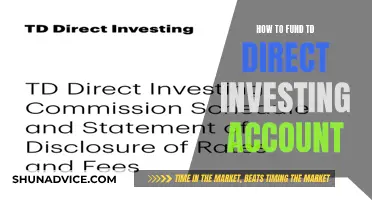
Raising capital for property investment can be challenging, but it's not as difficult as many people imagine. There are several options for funding a property investment, from traditional bank loans to more creative strategies like vendor financing or joint ventures. The key to raising capital is understanding what lenders want and being able to provide it. This means having a strong credit score, reliable income, and minimal debt. It also helps to build relationships with potential investors and showcase your past successes. With the right approach and a clear plan, you can secure the funding needed to begin your property investment journey.
| Characteristics | Values |
|---|---|
| Remortgage | Borrowing against the new value of a property that has risen due to improvements or market value increase |
| Sell | Selling a property that is not meeting your goals anymore |
| Pension | Withdrawing from a pension pot to use for investment |
| Joint venture | Teaming up with a family member or friend who has the cash, ideally in the form of a loan |
| Self-directed IRA accounts | Using retirement savings to invest in the real estate market |
| Hard and private money loans | High-risk loans from professional lenders or private individuals with a focus on collateral |
| Peer-to-peer (P2P) loans | Raising money for real estate from other investors through online marketplaces |
| Traditional investment property financing from a bank | Bank mortgages based on assessment of applicants' debt-to-income ratios, credit histories, and assets |
| FHA investment loan | Federal Housing Administration loan with lower down payment and credit score requirements, intended for owner-occupied multi-family homes |
| Private money lenders | Individuals with access to capital who deal directly with borrowers and can help with refinancing or buying new properties |
| Hard money lenders | Semi-institutionalized lenders that provide instant access to money, useful for rehab, quick flips, and those with poor credit scores |
| Wholesaling real estate | Contracting a property with a seller, finding a potential buyer, and assigning the contract to them at a higher price |
What You'll Learn

Save, remortgage, sell, use your pension, or enter a joint venture
Save
Saving is a gradual process of putting money aside, typically in a high-interest savings account. While it is a safer option than investing, it often yields lower returns, especially with the low levels of interest paid on savings accounts.
Remortgage
Remortgaging your primary residence or investment property can make your loan more manageable and give you access to cash to fund repairs, pay off debt, or reinvest. Refinancing can also help you secure a lower interest rate, change your loan term, or switch to a fixed-rate mortgage.
Sell
Selling an investment property can provide a good return, especially if you have reliable tenants in place, as this provides buyers with a guaranteed income from day one. However, tax changes, such as the reduction in mortgage interest tax relief, have made it less financially appealing to own rental properties.
Use your pension
You can use your pension fund to buy investment properties. This option allows you to diversify your retirement savings and take advantage of the potential for property values to increase over time.
Enter a joint venture
A joint venture in real estate involves multiple parties combining their resources and knowledge to complete deals that would otherwise be outside of their means. Each party maintains their own business identity while working together. This allows you to maximise your capital, increase your contacts, and secure deals that might not otherwise be possible.
Strategies for Investing Your Self-Managed Super Fund
You may want to see also

Traditional investment property financing from a bank
A conventional bank loan is a standard mortgage that conforms to the guidelines set by Fannie Mae or Freddie Mac. It is not backed by the federal government, unlike Federal Housing Administration, U.S. Department of Veterans Affairs, or U.S. Department of Agriculture loans.
Down Payment
Typically, a down payment of 20% of the home's price is expected for a conventional loan. However, for an investment property, lenders often require a larger down payment of 30% or more. A higher down payment of 25% or above may qualify you for a better interest rate.
Credit Score and History
Your credit score and history will determine your eligibility for a conventional loan and the interest rate. Lenders will also review your income, assets, and expenses to ensure you can afford the loan payments. It is recommended to have reserves to cover six to twelve months of mortgage payments.
Loan Types
There are different types of conventional bank loans:
- Adjustable-rate mortgages: These loans have a lower fixed-rate for an initial period, which then adjusts periodically based on market conditions, resulting in fluctuating monthly payments.
- Fixed-rate mortgages: These loans have a set interest rate and consistent monthly payments throughout the loan's life, providing stability and predictability for long-term financial planning.
- Jumbo loans: These loans exceed the Federal Housing Finance Agency's loan limits and are used for purchasing high-value properties. They have stricter credit requirements and higher interest rates.
Advantages and Disadvantages
Conventional bank loans offer lower interest rates and longer repayment periods than alternative financing options, making them more affordable in the long term. However, they often come with strict qualification requirements, larger down payment needs, and a lengthy approval process, which can delay property purchases.
Venture into Janus: Diversified Investment, Smart Returns
You may want to see also

Federal Housing Administration (FHA) investment loan
The Federal Housing Administration (FHA) offers loans that are insured by the government and issued by approved banks or lenders. FHA loans are intended to help low- to moderate-income families attain homeownership, and they are particularly popular with first-time homebuyers.
FHA loans are a good option for those who might find it difficult to obtain loans otherwise due to lower credit scores and limited cash for a down payment. The minimum down payment for an FHA loan is 3.5% if your credit score is 580 or above, and 10% if your credit score is between 500 and 579. The down payment can come from savings, a financial gift from a family member, or a grant for down payment assistance.
FHA loans are also advantageous because they often have lower interest rates than conventional loans, making them more affordable for borrowers. Additionally, FHA loans offer flexible credit requirements, making them accessible to individuals with credit scores as low as 500, which is within the "poor" range for a FICO score.
However, it is important to note that FHA loans come with some requirements and limitations. Borrowers are required to purchase mortgage insurance, which includes an upfront premium and an annual premium paid monthly. The upfront premium is typically 1.75% of the loan amount, while the annual premium ranges from 0.15% to 0.75% of the loan amount. FHA loans also have limits on the amount you can borrow, which vary by region. For 2024, the limits range from $498,257 to $1,149,825, with special higher limits for certain areas like Alaska, Hawaii, Guam, and the U.S. Virgin Islands.
Furthermore, FHA loans are intended for primary residences and cannot be used for investment or rental properties. To qualify for an FHA loan, the property must be owner-occupied and meet certain minimum standards. Additionally, FHA loans may have stricter requirements when it comes to the borrower's financial history, employment status, and debt-to-income ratio.
In summary, FHA loans are a great option for those who may face challenges in obtaining traditional financing due to credit score or down payment requirements. They offer flexible credit criteria, lower down payment options, and competitive interest rates. However, borrowers should be aware of the additional costs associated with mortgage insurance and the limitations on loan amounts and property usage.
Invest Wisely: Strategies from Pension Funds for Long-Term Growth
You may want to see also

Peer-to-peer (P2P) loan
Peer-to-peer lending is a great way to raise funds for property investment, especially if you have a less-than-perfect credit score. P2P lending platforms offer an alternative to traditional bank loans, connecting you directly with investors looking to fund your loan. Here's a guide on how to use P2P loans for property investment:
Understanding P2P Lending
P2P lending platforms offer a number of advantages over traditional loans. Firstly, they often use proprietary credit evaluation algorithms that look beyond FICO scores, making it easier for borrowers with fair credit to obtain funding. Secondly, by cutting out the bank middleman, investors receive a larger portion of the interest paid by borrowers. Finally, P2P lending can provide the feel-good benefit of knowing your loan is helping another person or small business.
Choosing a P2P Lending Platform
When selecting a P2P lending platform, it's important to conduct thorough research. Consider the risks, loan terms, penalties, and impacts of the loan. Ask questions about the protections in place for both borrowers and lenders. Ensure the platform provides clear information about loan terms and borrower protections. Some recommended P2P lending platforms include Prosper, Funding Circle, Kiva, and Upstart.
Applying for a P2P Loan
Most P2P lending platforms offer pre-qualification tools that allow you to check your eligibility and view sample rates and terms without affecting your credit score. When applying for a loan, you'll typically need to provide personal information such as your Social Security number and employer information. The platform will perform a hard credit inquiry and, if approved, will submit your information to investors for funding.
Investing in P2P Loans
While there are now fewer options for individual investors in P2P loans, some platforms like Prosper still allow individuals to invest. With Prosper, you can invest with a minimum amount of $25, and their average historical return is 5.50%. Other P2P lending platforms focused on real estate investments include Fundrise and PeerStreet, which have minimum investment requirements of $10 and $1,000, respectively.
Benefits and Risks of P2P Loans
P2P loans offer several benefits, including increased access to funding for borrowers who may not qualify for traditional loans. They also provide investors with the opportunity to earn higher returns than traditional savings accounts. However, it's important to remember that, as with any investment, P2P lending comes with risks. Investors should diversify their risk by spreading their investments across multiple borrowers to minimize the impact of a potential default. Additionally, individuals should only invest money they can afford to lose.
Rockbridge Fund: A Guide to Investing Wisely
You may want to see also

Private money lenders
Refinancing a Property
Buying a New Property
Private money loans can assist investors in purchasing new residential, commercial, or multifamily properties. To secure these loans, it is essential to analyse the numbers and craft a compelling pitch. Experienced investors can showcase their successful past deals, while first-time investors should focus on highlighting the potential profitability of the venture. Building relationships with multiple potential private lenders is beneficial so that investors are prepared when an attractive deal arises. Private money can enable investors to acquire new properties much faster than other lenders.
Finding Private Lenders for Real Estate
Finding private lenders for real estate investments can be challenging, but it is crucial to remember that the relationship is a two-way street. Here are some tips for locating and securing private lenders:
- Understand private real estate loans: Familiarise yourself with the terminology and differences between private lenders, hard money lenders, and traditional financial institutions. Private lenders are typically individuals not affiliated with financial institutions who lend funds based on the value of the property and the investment opportunity.
- Build a network: Start building connections with professionals in the industry, such as real estate agents, investors, attorneys, and private investors. Many private lenders can be found through referrals within your real estate network. Also, expand your contact list to include people outside the industry, such as friends, family, and colleagues, who may be potential investors or have valuable connections.
- Prepare your materials: Create a company overview that highlights your education, goals, past deals, and experience. Develop a presentation or video showcasing your successful projects, including pictures, numbers, and relevant information. Ensure you have a clear understanding of the private investor process and the required documents, such as a promissory note and insurance.
- Select your private lender: Collect and compare multiple loan offers before making a decision. Ask about their loan terms, interest rates, fees, and the schedule for dispersing funds. Choose a lender that presents the least amount of risk and suits your needs.
Robinhood's S&P 500 Index Fund: A Step-by-Step Investment Guide
You may want to see also
Frequently asked questions
There are several ways to raise funds for property investment, including saving, remortgaging, selling, pensions, joint ventures, vendor financing, property sourcing, refinancing, bank mortgages, Federal Housing Administration (FHA) loans, peer-to-peer (P2P) loans, private money lenders, hard money lenders, and wholesaling.
Using personal savings can be a straightforward way to raise funds for property investment, but it may not always be feasible, especially if you don't have enough cash available. While saving can help you avoid debt and interest payments, it may take a significant amount of time to accumulate the necessary capital. Additionally, investing your own money may limit your purchasing power and ability to scale your investments.
Alternative methods include:
- Remortgaging: Borrowing against the increased value of your property can provide tax-free equity, but it increases debt and interest payments.
- Selling: Disposing of an old property can unlock capital, but may incur capital gains tax.
- Pensions: Withdrawing from your pension pot is risky and may attract income tax, capital gains tax, and inheritance tax.
- Joint ventures: Partnering with others can provide access to additional funds and shared expertise, but it's important to establish clear agreements.







